
Guests
- Nekima Levy ArmstrongMinneapolis-based civil rights attorney, activist and founder of the Racial Justice Network.
This Sunday marks five years since George Floyd was murdered by former Minneapolis police officer Derek Chauvin. In a video that shocked the world and spurred a global movement for racial justice, Chauvin pinned Floyd to the ground with a knee to his neck for eight minutes while Floyd gasped for air. Floyd repeatedly said, “I can’t breathe.”
Despite the nationwide uprising that followed Floyd’s killing, Congress failed to pass legislation that sought to reduce racial profiling and the use of force by law enforcement. The Trump Justice Department dismissed police reform and oversight agreements in Minneapolis and Louisville earlier this week, just days ahead of the fifth anniversary. We speak with Nekima Levy Armstrong, Minneapolis-based civil rights attorney, activist and founder of the Racial Justice Network, on where the movement for racial justice stands today.
Transcript
AMY GOODMAN: This is Democracy Now!, democracynow.org, The War and Peace Report. I’m Amy Goodman.
This Sunday marks five years since George Floyd, an African American man, was murdered by former Minneapolis police officer Derek Chauvin, who is white. In a video that shocked the world, spurred a global movement for racial justice, Chauvin pinned George Floyd to the ground with a knee on his neck for eight minutes while George Floyd gasped for air. In a video that’s now been seen around the world, he repeatedly said, “I can’t breathe.” A warning: The video is extremely graphic.
EYEWITNESS 1: You have your knee on his neck.
EYEWITNESS 2: You’ve got your knee right on his neck, officer.
EYEWITNESS 1: He ain’t even resisting arrest.
GEORGE FLOYD: I cannot breathe.
EYEWITNESS 3: Are you having fun?
GEORGE FLOYD: I cannot breathe.
EYEWITNESS 1: You’re just a grown — you’re a tough guy. You’re a tough guy, huh?
OFFICER TOU THAO: What’s that?
EYEWITNESS 1: I said he’s a tough guy. He’s not even resisting arrest, bro.
OFFICER TOU THAO: Did you get the whole part when we fought with him?
EYEWITNESS 1: But, bro, why are you just sitting there? He ain’t doing nothing now. Put him in the car.
GEORGE FLOYD: Don’t kill me. Don’t kill me.
AMY GOODMAN: Three other officers stood with Derek Chauvin, one of them holding back those who wanted to help George Floyd.
In the days that followed, thousands took to the streets of Minneapolis, and demonstrators set fire to a police precinct just hours after prosecutors said they were not yet sure if they would criminally charge Chauvin for murdering George Floyd, as seen in the video. Even as police fired tear gas and rubber-coated bullets at demonstrators, the protests spread to become the largest nationwide uprising since the ’60s, as protesters shut down cities across the United States.
PROTESTERS: George Floyd!
PROTESTER 1: Say his name!
PROTESTERS: George Floyd!
PROTESTER 1: What’s his name?
PROTESTERS: George Floyd!
PROTESTER 1: Say his name!
PROTESTERS: George Floyd!
PROTESTER 2: What do we want?
PROTESTERS: Justice!
PROTESTER 2: When do we want it?
PROTESTERS: Now!
PROTESTER 2: What do we want?
PROTESTERS: Justice!
PROTESTER 2: When do we want it?
PROTESTERS: Now!
PROTESTER 2: If we don’t get it?
PROTESTERS: Shut it down!
PROTESTER 2: If we don’t get it?
PROTESTERS: Shut it down!
PROTESTER 2: If we don’t get it?
PROTESTERS: Shut it down!
AMY GOODMAN: Despite the uprising that followed George Floyd’s killing, Congress failed to pass the legislation named in Floyd’s memory that sought to reduce racial profiling and the use of force by law enforcement.
This comes as the Justice Department this week dismissed police reform and oversight agreements in Minneapolis and Louisville, just days ahead of the fifth anniversary of the police murder of George Floyd. The consent decrees came in response to Floyd’s murder, as well as the Louisville police killing of Breonna Taylor, March 13th, 2020, after federal investigations found patterns of unconstitutional and racist police practicing in both cities. The Trump administration disputed those findings and dismissed the consent decrees as “federal micromanagement.”
For more, we’re joined in Minneapolis by Nekima Levy Armstrong, civil rights attorney, activist, founder of the Racial Justice Network, previously served as president of the Minneapolis NAACP.
Nekima, welcome back to Democracy Now! We first spoke to you in 2020, two days after George Floyd’s murder. Can you talk about the significance of this moment and what we can learn from what happened at the time, first the charges not being brought, then it being taken out of the hands of the local authorities, and the state of Minnesota brought those charges?
NEKIMA LEVY ARMSTRONG: Thank you for having me, Amy.
We can learn from that moment that people in our community are not going to sit on the sidelines when folks in elected positions take their time in bringing about justice. As you know, there was an uprising that occurred in the city of Minneapolis as people applied pressure to elected officials to do their jobs and to ensure accountability, not only for Derek Chauvin, but the other three officers, as well, who were involved in the brutal killing of George Floyd.
AMY GOODMAN: Explain what the protests did. You know, we talked about the local authorities saying they weren’t sure if they were going to bring charges. And then you had Keith Ellison, the attorney general of the state of Minnesota, who had formerly been a congressmember, and the governor. Talk about how the responsibility then shifted, and the charges were brought. And what happened to these four police officers?
NEKIMA LEVY ARMSTRONG: Thank you for that question.
I will say that it’s important for people to understand that even when there is a video of heinous police abuse, that does not guarantee that justice will occur, as we just saw with Tyre Nichols and the way in which that particular case has panned out.
So, in the city of Minneapolis, one of the first steps was ensuring that all four officers were fired for their misconduct. And that was the result of Chief Medaria Arradondo, our city’s first Black chief of police, making that decision within hours after George Floyd’s murder came to light, and meeting with Black community leaders to hear our perspectives before making that decision. Once that happened, of course, we had the first protest planned, where thousands of people showed up at the site where George Floyd was killed. We marched to the 3rd Precinct police station, where the officers had typically worked who were responsible for killing George Floyd. And then, from that point, we started a rallying cry for those officers to be charged and arrested for what they did.
Now, the governmental officials were slow to respond initially, and after some public pressure, the county attorney at the time, Mike Freeman, decided to only charge Derek Chauvin. The charges were legally insufficient — they were below the standard — as well as the criminal complaint against Derek Chauvin. So, when I saw that, I reached out to movement lawyers through the National Lawyers Guild. I expressed my concerns about the process. They agreed with me. So we called a mass demonstration, along with other activist organizations, like Black Lives Matter, and we had thousands of people in front of the governor’s mansion explaining to people how the charging decision by the county attorney was inadequate. And Governor Walz actually came out of his mansion. He listened to us break down what the concerns were, how things needed to change. And after that, I received a call from his staff to meet with him directly. So he and I had a Zoom call. During that call, I laid out more of the legal issues, as well as the fact that he needed to use his executive authority to remove the case from the hands of the county attorney and to put the case into the hands of the attorney general.
And, Amy, you and the rest of the world saw the results of that trial during the prosecution of Derek Chauvin, which was a master class on how to effectively and successfully prosecute a cop who used deadly force unjustifiably. Once the case was in the hands of the Attorney General’s Office, the other thing that happened is that not only was Derek Chauvin charged, but all four of the officers were charged, as well, and the charges for Derek Chauvin were also upgraded. And as you know, ultimately, all four of those officers were convicted in state and federal court as a result of the murder of George Floyd.
AMY GOODMAN: In 30 seconds, can you tell us about Trump lifting the consent decrees off of the Minneapolis Police Department, Louisville — Breonna Taylor — the significance of this?
NEKIMA LEVY ARMSTRONG: It is very clear that Donald Trump’s intention is to roll back the progress that began, I would say, in 2020, and even before that, when the folks in Ferguson, Missouri, rose up after Mike Brown was killed. It is a slap in the face to the Black community and communities around the country for Trump’s DOJ to withdraw from the consent decree process. It’s unconscionable. It’s unacceptable.
And I would argue that it is an attempt to create a race war, wanting us to take to the streets so that Donald Trump can use martial law against protesters. But we’re not falling for the bait. We are continuing to call out these injustices and to say that we are expecting accountability. We’re expecting reform and transformation of police departments that engage in unconstitutional policing practices.
AMY GOODMAN: Nekima, we just have another 30 seconds. And my question to you is — the police murder of George Floyd happened during the first term of President Trump. To say the least, he’s been openly hostile to the Black Lives Movement. In 2020, he reportedly ordered the military to, quote, “beat the f— out of” BLM protesters, even shoot them. Where does the movement go from here, as you mark it in Minneapolis this weekend?
NEKIMA LEVY ARMSTRONG: I think that the movement has to continue to grow stronger. We have to resist the pressure that is coming from the White House to be silent and to feel as if the concerns that we’re bringing don’t hold merit. We know that is not the truth. We know that racial injustice in America is still alive and well. We know that police brutality continues to occur at alarming rates. And we have to continue to use our voices and stand up against Donald Trump and stand up against these systems of oppression, regardless of the pressure that he is attempting to apply in this hour. This moment calls for us to rise up and continue to take a stand for freedom, justice and equality in this country, and especially for those who are most vulnerable to police violence and oppression.
AMY GOODMAN: Nekima Levy Armstrong, I want to thank you for being with us from Minneapolis, civil rights attorney, activist, founder of the Racial Justice Network.

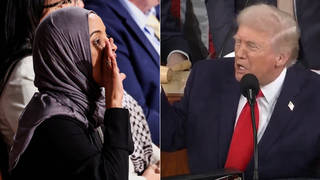
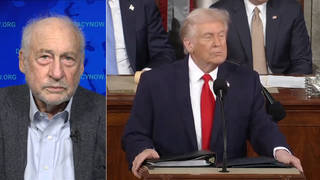
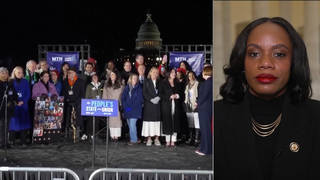
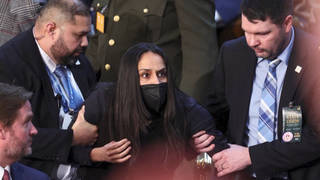





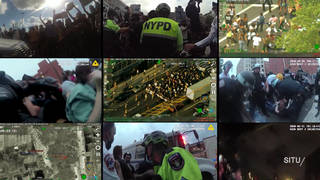
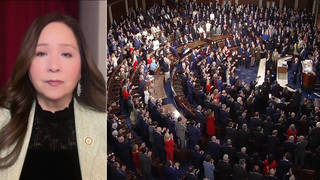
Media Options